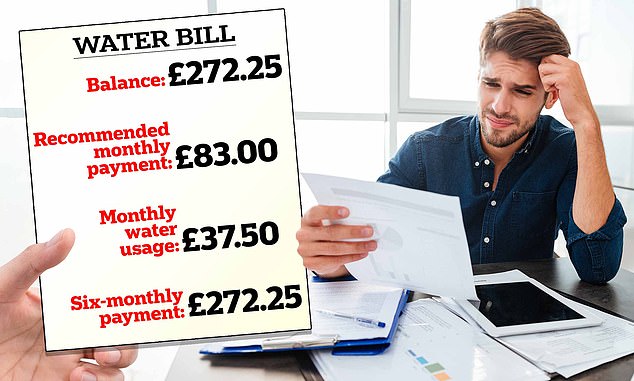We recently received our latest bill from South East Water and are being charged £272.25 for six months.
My water bills are sent twice a year, and I pay as soon as it arrives.
The bill says my average monthly water usage is £37.50. Times that by six months and it is £225, about £50 less than the amount of my bill. A year would be £450. That all makes sense.

How much? A reader’s water bill shows his usage is £37.50 on average – but if he chose to pay monthly rather than every six months, he would need to fork out £83
But if I was to pay monthly, the bill says I would need to pay £83 per month. That would mean £498 for six months or £996 for a year.
How is it fair that paying monthly comes with such a big penalty? A.B, S.E England
Helen Crane of This is Money replies: Thank you for sending me a copy of your bill. I, too, was surprised to see such a big jump in payments depending on whether you chose bi-annual or monthly billing.
By April the average water bill will stand at £473 per year, having risen by more than £50 per year since 2020-21 – so I understand why customers like you are keen to keep tabs on what they are paying.
The industry has defended the hikes by saying that water firms need to improve infrastructure following public backlash against water shortages and cases of sewage pumped into rivers.
According to your South East Water bill, opting to pay monthly would see you pay £498 spread across the next six months.
That is almost double the amount you would pay if you paid off the six-monthly bill in one go, so I understand why you don’t feel this is fair.

Steep rise: The typical water bill is going up £27 this year to £473, having risen since 2020/21
Paying the six £83 payments would clear the existing £272.25 debit on your account, which relates to your water use over the previous six months, and leave you with £226 in credit.
There is also an argument that the monthly amount may need to be slightly higher than your current usage, in case you used more water in future months and needed a bit of a buffer.
You do have a water meter, though, so you are able to keep tabs on how much you are using and hopefully avoid this.
The credit you built up could go also towards paying future bills. However, requiring you to pay so much more than what you currently owe seems excessive.
You say you are able to pay for six months at once, but feel it is unjust that those who cannot afford to do so are effectively forced to pay for six months future credit upfront.
I agree. According to the Consumer Council for Water, almost a fifth of customers now struggle to afford their water bill.
Sadly, companies of all kinds often bump up the price for those who need to spread the cost of their bills into monthly payments, rather than paying them off all in one go. But even then, it is rare that the cost more than doubles.
So was the figure a mistake, or is this really what is happening? I contacted South East Water to ask it to clear things up.
Simon Mullan, head of retail household for South East Water, confirmed that the figure was accurate, and that if you switched to monthly payment you would be required to pay £83.
‘As our customer has not paid for the last six months, the first time the customer chooses this payment option, it will pay towards the balance outstanding, plus the customer’s monthly usage,’ he added.
However, he said that this figure would be ‘subject to monthly review’ which would happen automatically each time a bill was sent and would be based on your water usage as reported by your meter.
To me, it sounds as if those who can pay twice a year are allowed to use water first, and then pay for it later.
But those who can’t afford to pay so much at once are left paying more in the long term, as the high monthly payments effectively force them to build up future credit they may not need.
Mullan said South East Water’s standard monthly plans were ‘pay as you go’ and that the system was designed ‘to avoid customers falling behind with their payments’.
He also said it offered ‘affordable’ payments for those that were unable to make the full recommended amount, as well as the option to spread bills over a longer period.
It is worth noting that customers are able to ask for credit they hold with their water company to be paid back to them, as they can with gas and electricity companies.
However, the fact that they can claim it back later will not be much comfort to those struggling to meet the higher monthly payments today.
Some links in this article may be affiliate links. If you click on them we may earn a small commission. That helps us fund This Is Money, and keep it free to use. We do not write articles to promote products. We do not allow any commercial relationship to affect our editorial independence.




